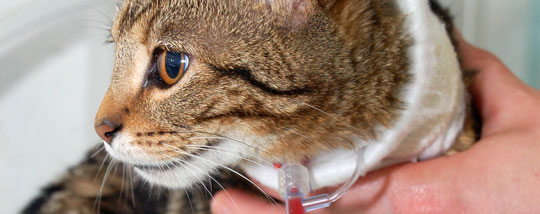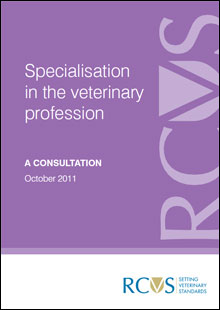The future of veterinary specialisation: a consultation
7 October 2011
The use of postnominals and titles by veterinary surgeons should be rationalised in order to avoid confusion amongst the public - that's one of the proposals in a consultation on the future of veterinary specialisation which opens today.

The proposals are submitted for comment by our Specialisation Working Party, which is chaired by former Chief Medical Officer Professor Sir Kenneth Calman.
The Working Party’s review was catalysed by a finding that the structure of veterinary specialisation is "confusing and opaque" to both animal owners and the profession (Unlocking Potential - a Report on Veterinary Expertise in Food Animal Production, by Professor Philip Lowe, 2009).
The emphasis throughout is on simplification and improvement
(Sir Kenneth Calman)
The Working Party has explored the routes to RCVS Recognised Specialist status.
It has looked at the use of ‘specialist’ more broadly, given the fact that it is not a protected term in the veterinary field, and has considered animal owners’ expectations of a ‘specialist’.
The Working Party also makes proposals for encouraging more veterinary surgeons to become specialists, given that there are currently only 319 on the RCVS List of Recognised Specialists, out of a UK practising arm of the profession of some 17,400 veterinary surgeons.
The proposals from the Working Party could have far-reaching impact.
One suggestion is that all those meeting the criteria for specialist status would also become Fellows of the RCVS (FRCVS) - a status currently only held by those who complete a thesis or exam, or who qualify on the basis of 'meritorious contributions to learning'.There are also proposals that the term 'RCVS Recognised Specialist' be dropped and replaced with the much simpler term ‘specialist’ or ‘veterinary specialist’.
Further proposals include the introduction of a 'middle tier' of veterinary surgeons - potentially to be called 'advanced practitioners' - who would be below full specialist status and subject to periodic revalidation.
There are recommendations that veterinary surgeons should be obliged to explain referral options to their clients, including the level of expertise of those to whom they are referring cases.
The future of the RCVS subject boards, which currently manage the various Certificate and Diploma examinations, is also considered in the proposals.
The emphasis throughout is on simplification and improvement, according to Professor Sir Kenneth Calman, who adds: "New legislation to introduce statutory registration for veterinary specialists would no doubt make things clearer, as it is for doctors and dentists, but, in the meantime, we believe there are a number of actions which the RCVS could take to improve matters."
The consultation paper can be downloaded from our consultations section, and comments are welcomed from members of the public, veterinary surgeons and veterinary nurses.
The closing deadline for comments, which should be sent to RCVS Head of Education, Freda Andrews, by Friday, 9 December.
Comments received will be considered by the RCVS committees and Council in early 2012.
